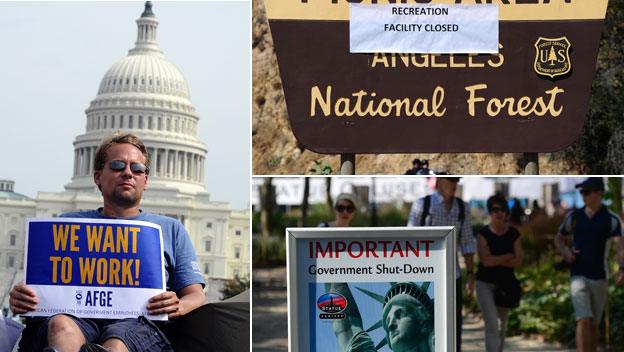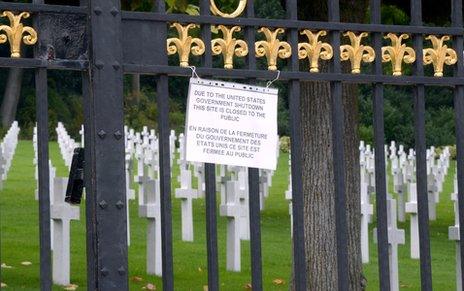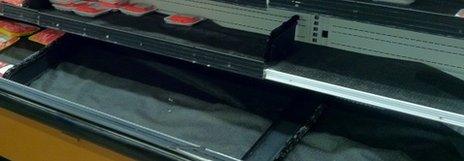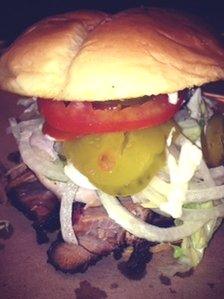US shutdown: 10 unexpected consequences
- Published

A closed sign on national parks and monuments across the US is the most visible consequence of a budget wrangle that has caused large parts of the government to shut down. But what about the more surprising consequences?
1. One person maintaining the Canada border
It's a 5,525-mile (8,891km) border, with 8,000 obelisk monuments dotted along it. These are cast-iron and stand five feet high, on a three-foot concrete base. Cleaning and maintenance is usually in the hands of eight field officers but seven of them have been told to stay at home.
That leaves acting commissioner Kyle Hipsley on his own. Speaking from a field office in Montana, he said everything was under control.
The other main job of his team, the clearing of trees on the border, can still carry on because it's in the hands of two five-man teams of contractors. But only until the money runs out.
2. Cemeteries in Europe are closed

Suresnes American Cemetery near Paris is one of dozens to be closed
Some 125,000 US soldiers, mostly killed in the two World Wars, are buried in 24 graveyards around the world, 20 of them in Europe. They are all closed, according to a statement on the website, external of the American Battle Monuments Commission.
"I think the way the shutdown has included our overseas veterans' cemeteries is a great shame," says Perry Jefferies of the TexVet organisation in Texas, who served in the first Gulf War.
"These are places of honour and many who travel to them will only have one chance in their lifetime to pay respect to a fallen comrade, family member, or buddy."
3. Sanctions respite for Iran
The under-secretary of state for political affairs, Wendy Sherman, says the ability to enforce sanctions on Iran has been significantly hampered.
"Note, our ability to do that, to enforce sanctions, to stop sanction evaders, is being hampered significantly by the shutdown," she told the Senate foreign relations committee on Thursday.
The Office of Foreign Assets Control, the Treasury team responsible for overseeing the sanctions, was "utterly depleted", she said.
4. A meat rush in Kentucky

A strange sight greeted shoppers in a store on the military base Fort Campbell on Monday. Aware that the shutdown could close the shop for days, shoppers were stacking their trolleys high with meat.
"I'm doing my weekly shop with my two boys and I see these women with their carts stacked high with six, seven, eight or nine packages of ground meat and eight big packages of chicken breasts," says Amy Bushatz, wife of Captain Luke Bushatz
"I was thinking, 'What's going on?' but then I remembered the shutdown... So there was a meat rush."
There's a Walmart a mile outside the base, says Amy, a military spouse blogger, external, but it's generally more expensive, especially for meat.
5. That race you've trained a year for... it's off

The Grindstone 100 running race, in which 200 elite athletes run for 100 miles along the southern Appalachian mountains of West Virginia, has been suspended because it was due to go through a national park.
That's a year's training for nothing, says race director and creator Clark Zealand. Even if the race is rescheduled, there are plenty of entrants who won't be able to make it.
"It's very disappointing. This is the sixth year of the race and it's been building each year, with people from 30 states including Hawaii, and Canada," he says.
The race starts at Camp Shenandoah, Virginia, and has 23,000 feet of climbs. It's never been run in less than 17 hours.
This isn't normal distance running, says Zealand. Competitors must train the gut to digest food on the go, and then there's the mental battle. "You can go through the highs and lows of life during a 100-mile race."
6. More James Bond buffs
Smithsonian museums in Washington DC are closed, so visitors to the capital - and civil servants with time on their hands - are visiting private museums and galleries instead.
The International Spy Museum in Washington DC has seen a 30% increase in visitors, says its PR manager, Jason Werden. "There's been a benefit - we've certainly seen an uptake in visitors." Its current highlight, he said, is its exhibition on 50 years of James Bond villains.
Other institutions that have enjoyed a spike in visitors include the Newseum, the Phillips Collection, the National Geographic Museum and the National Building Museum.
7. Free food for civil servants

A Government Shutdown Sandwich
Cafes and restaurants are offering discounts and freebies to any of the 800,000 federal workers who are no longer at their desks.
At Sugarfire Smoke House in St Louis, the so-called Government Shutdown Sandwich - beef brisket, smoked turkey, pulled pork, lettuce, tomato, onion and pickle - has been snapped up by employees unexpectedly kicking their heels this week. And it's free, no identity card required.
"We have a lot of government employees in St Louis," says restaurant owner Mike Johnson.
"I'm upset they're out of work just because these guys can't get along. We gave away 50 yesterday and 100 today. I'd give away 1,000 and I wouldn't care. If I lose a bit of money, so be it. I opened a year ago and it's been a good year."
There are dozens of similar deals - especially for sandwiches and baguettes - to be found in the cafes and restaurants of Washington DC and over the Potomac River in Arlington, Virginia.
8. Satirical T-shirts
T-shirts lampooning Washington's dysfunction have been selling well. Raygun, a business based in Des Moines, Iowa, didn't waste any time in launching a shirt with the slogan "The shutdown 2013 - no productivity, no mercy". About 200 were sold on Tuesday and 150 on Wednesday.
"Depending on how long this goes, we'll be able to roll out an 'I survived the shutdown' with some barrel fires and 'The Road'-esque desolation," says founder Mike Draper.
Other companies also got in on the action. "Furloughed, non-essential employee. Don't ask me, it's my day off" said one T-shirt.
9. Cancer drug trials on hold
The National Institutes of Health will turn away roughly 200 patients each week from its clinical research centre in Maryland, including children with cancer, one of its directors has said, external.
Trials at the centre are usually for people who have tried other treatments without success. While existing treatments will continue, it will not take on new patients until Congress agrees a budget and government reopens.
Other trials have also been affected. In Massachusetts, father-of-three Leo Finn, who has a rare bile duct cancer, was told a clinical trial he was due to start next week had been put on hold.
The reason, he was told, was that the trial was unable to be correctly registered during the shutdown - but late on Thursday he was relieved to hear that the Food and Drug Administration had found a solution.
10. British people now know what 'furlough' means

It's a word that is rarely heard in the UK but it's been inescapable in the media coverage of the latest political crisis to grip Washington.
While very familiar to Americans, its mention will have had the British reaching for dictionaries.
"To grant (a person) a furlough; to give leave of absence to," is what they will find when they open them - at least, if it's the Oxford English Dictionary.
It could yet infiltrate British conversations, although it might require a US-style shutdown at Westminster to do it.
You can follow the Magazine on Twitter, external and on Facebook, external